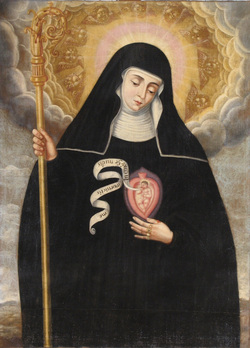
In the thirtieth year of her age she was elected Abbess of Rodersdorf, where she had professed herself in the religious life, and afterwards of Helfta. This office she bore for forty years in love, wisdom, and zeal for strict observance, so that the house seemed like an ideal exsample of a sisterhood of perfect nuns. To each one she was a mother and a teacher, and yet would be as the least of all, being in sooth in all lowliness among them as she that served. That she might be more utterly God's only, she tormented her body with sleeplessness, hunger, and other afflictions, but withal ever true to herself, stood forth a pattern of innocence, gentleness, and long-suffering. The salvation of her neighbours was her constant earnest endeavour, and her godly toil bore abundant fruit. The love of God oftentimes threw her into trances, and she was given the grace of the deepest contemplation, even to union of spirit with God.
Christ himself, to show what such a bride was to him, revealed that he had in the heart of Gertrude a pleasant dwelling-place. The Virgin Mother of God she ever sought with deep reverence as a mother and warden whom she had received from Jesus himself, and from her she had many benefits. Toward the most Divine Sacrament of the Eucharist, and the sufferings of the Lord, her soul was moved with love and gratitude, so that she sometimes wept abundantly. She helped with daily gifts and prayers the souls of the just condemned to the purifying fire. She wrote much for the fostering of godliness. She was glorified also by revelations from God, and by the gift of prophecy. Her last illness was rather the wasting of a home-sickness to be with God than a decay of the flesh, and she left this life in the year of our Lord 1292. God made her bright with miracles both during her life and after her death.




